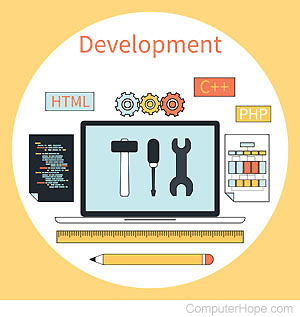Programming tool

A programming tool is an application that helps developers create, test, optimize, debug, and maintain other programs. It is designed to assist programmers in various tasks throughout the software development life cycle. Programming tools can be part of a larger single program called an IDE (integrated development environment) or run by themselves from the command line.
Programming tools are categorized as different types based on their functions and purpose, but the most basic are compilers, interpreters, and source code editors (like Notepad++ and Atom). Some tools, like debuggers and profilers, are made with a specific purpose.
List of programming tools
The following list contains several examples of applications that are considered to be programming tools.
- Text editors - Text editors are uncomplicated tools designed for editing source code.
- Lint software - Lint software identifies syntax errors, deviations from industry standard syntax, common programming errors, and potentially incorrect constructs. It is specific to the programming language it's checking.
- Debuggers - Debugging tools help programmers identify and fix errors (bugs) in their code.
- Version Control Systems - VCS tools, such as Git, help developers manage changes to source code over time. They enable collaboration by allowing team members to track and revert each other's changes using a system of pushes and pulls.
- Compilers and interpreters - Compilers translate source code to machine code or some intermediate form, while interpreters can execute code directly. Examples include GCC (GNU Compiler Collection), a compiler, and Python, an interpreted language.
- Performance profilers - These tools help developers analyze the performance of their code by identifying bottlenecks and resource-intensive areas.
- Database management tools - Tools like MySQL assist in the development, querying, and management of databases.
Developer, Machine language, Programming terms, Script, Task, Tools
